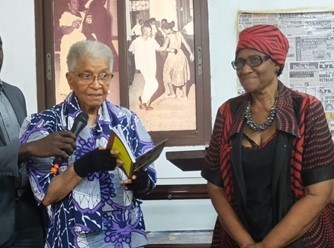The Ebola outbreak of 2014-2016 left an indelible scar on Liberia, a nation still grappling with the psychological and spiritual aftermath of the devastating epidemic. Former President Ellen Johnson Sirleaf, at the launch of “Stepping Up To The Plate: Liberia’s Untold Ebola Story,” recounted the initial confusion and fear as a mysterious illness, later identified as Ebola, crossed the border from Guinea. The rapid spread and high mortality rate necessitated a swift and decisive response. The Liberian government implemented stringent measures to contain the virus, urging citizens to stay put and seek medical attention, defying World Health Organization projections of catastrophic losses. Sirleaf emphasized the crucial role of Liberian medical experts like Dr. Jerry Brown, the late Dr. Walter T. Gwenigale, and Dr. Phillip Ireland in combating the epidemic. The book also recognizes the significant contributions of Dr. Tolbert Nyenswah, the former Incident Manager of Liberia’s Ebola response.
Central to Liberia’s success in containing Ebola was a unified national response. Churches, businesses, students, and communities rallied together under a single, cohesive strategy. President Sirleaf underscored the importance of national ownership of the response, resisting the imposition of external dictates. This unity of purpose, coupled with empowering community health workers, proved decisive in turning the tide against the epidemic. This locally-driven approach, Sirleaf noted, was replicated effectively during the subsequent COVID-19 pandemic. The book launch, held at the National Museum in Monrovia, served as a poignant reminder of the nation’s collective trauma and its eventual triumph over adversity.
Ambassador-at-Large Ora Richards, representing President Joseph Nyuma Boakai, lauded the resilience of the Liberian people, highlighting their determination and capacity for progress under effective leadership. Richards advocated for widespread distribution of the book, suggesting translation into local dialects to ensure accessibility for all Liberians. She emphasized the importance of controlling the narrative surrounding the Ebola crisis, asserting Liberia’s right to tell its own story, lest others misrepresent it. The book itself is a collaborative effort of the Liberia Institute for Growing Patriotism (LIGP) and the Angie Brooks International Centre for Women’s Empowerment, Leadership Development, International Peace & Security (ABIC).
The book launch event drew a diverse crowd, including government officials, international partners, diplomats, and students, all united in commemorating Liberia’s fight against Ebola. Information Minister Jeremiah Mathew Piah framed the book not merely as a publication, but as a testament to Liberia’s survival through an extraordinarily dark chapter. He commended LIGP and ABIC for documenting and preserving the story of the nation’s resilience. The event incorporated symbolic elements, such as candle lighting, to represent unity and solidarity.
Olubanke King-Akerele, Executive Director of LIGP and Board Chair of ABIC, highlighted former President Sirleaf’s instrumental role in mobilizing international support during the crisis, engaging with global powers like the US, EU, China, the UN, and ECOWAS. King-Akerele proposed the establishment of a memorial garden at the National Public Health Institute of Liberia (NPHIL) to honor the victims of Ebola, announcing that half of the proceeds from the book would be dedicated to this cause. She emphasized the importance of Liberians sharing their own narrative of survival, emphasizing the book’s role in achieving this.
Cllr. Yvette Chesson-Wureh, Establishment Coordinator of ABIC, detailed the organization’s significant contributions during the crisis. ABIC’s youth teams played a vital role in community outreach, conducting door-to-door awareness campaigns and providing education on the proper use of protective equipment. ABIC also served as a crucial intermediary between the government and local communities, facilitating communication and understanding during a time of heightened tension and fear. The Ebola outbreak in Liberia, beginning in March 2014, exposed the fragility of the nation’s healthcare system, which at the time had only one doctor for every 70,000 people. By October 2014, the virus had spread to all 15 counties. While the number of cases began to decline in January 2015, Liberia faced brief resurgences of the virus before finally being declared Ebola-free in January 2016.
The official figures paint a stark picture of the epidemic’s impact: 10,666 Liberians infected and 4,806 lives lost. The combined Ebola response across Liberia, Guinea, and Sierra Leone amounted to a staggering US$53 billion. “Stepping Up To the Plate: Liberia’s Untold Ebola Story” stands as a powerful testament to the resilience, courage, and unwavering patriotism that characterized Liberia’s fight against one of the most devastating epidemics in recent history. The book captures not only the harrowing experiences but also the collective determination and innovative strategies that ultimately led to victory against the deadly virus. It serves as both a memorial to those lost and an inspiring chronicle of a nation’s capacity to overcome adversity through unity and collective action.


